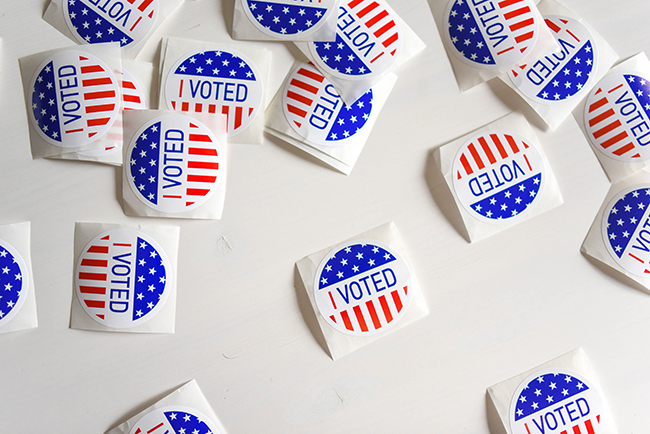
Our love for our brothers and sisters in the church should matter more to us than the political opinions that divide us.
By Daniel Darling
We just endured an intense season as Americans went to the polls, and the next political season will be here before we know it. For many pastors, the last few years have been wearying as our communities grow increasingly polarized and the political rhetoric has ratcheted up. Pastors preach sermons on Sundays, but their people are inundated with content Monday through Friday streaming through their earbuds, scrolling across their screens, and shouting at them from their TVs.
So how do churches navigate politics in this moment? Every community and every congregation will look a bit different, and local issues and immediate context will demand specific approaches. But here are some ways pastors can lead well in this moment:
1. Express gratitude for the opportunity of politics
Be thankful for robocalls, yard signs, and grainy TV ads that paint opponents as monsters? Well, that might be a bridge too far. But have you considered that in many places around the world, nobody is complaining about politics? In totalitarian regimes, nobody is complaining about partisanship. Surely, those who suffer under the thumb of unjust rulers would love to participate in the messy way we elect our leaders.
“To have a voice and a vote, to be able, in some small way, to shape the world in which we and our neighbors live, is a gift and stewardship.” — @dandarling Click To TweetSure, we are often presented with less-than-ideal choices, and the rhetoric of our elections is increasingly caustic. But to have a voice and a vote, to be able, in some small way, to shape the world in which we and our neighbors live, is a gift and stewardship. So, before you let out that big post-election sigh, thank God for representative government.
2. Remember the gospel is political
The Bible is not partisan in that no political party fully embodies the values of the kingdom of God and every politician is a flawed human in need of mercy and grace. However, the Bible is political. In the Old Testament, the prophets often spoke a word of rebuke on behalf of God toward the wicked rulers of the age. In the New Testament, Jesus’ birth and death signaled the inauguration of God’s new kingdom—one that was a threat to the kingdoms of men.
So, when Christians gather on Sundays and declare that Christ—and not any other human ruler—is sovereign over all things, it cuts against the spirit of the age. The way of Christ—from sexual ethics to materialism to human dignity—is in opposition to the way of the world. So, Christians should gather and worship knowing their presence as God’s people is not some idyllic, feel-good experience but a declaration of war against the principalities and powers. Church on Sunday should never be partisan. It would be a violation of the third commandment to paste Jesus’ name to a political party when God’s people gather as the church. But the church should make no mistake: the gospel is political.
3. Hold fast to issues that matter
There are certain issues about which the Bible speaks loudly, such as the sanctity of human life, the evil of racism, and the definition of marriage. There is really no way to explain away what the Bible makes clear. Pastors should not flinch from addressing these topics, even if they make people uncomfortable. Jesus instructs his disciples with the Great Commission to teach “them to observe everything I have commanded you” (Matthew 18:16-20, CSB) and with the Great Commandment to “love your neighbor as yourself” (Matthew 22:35-40, CSB).
“Christians should not only live out the radical way of Jesus but should apply His words in the way we steward our citizenship.” — @dandarling Click To TweetChristians should not only live out the radical way of Jesus but should apply His words in the way we steward our citizenship. It’s right for Christians to stand up for the unborn and the elderly. It’s right for Christians to resist racism and advocate policies that strengthen the nuclear family. And it’s right for Christians to seek to alleviate human suffering, such as poverty.
4. Hold loosely to secondary issues
While Christians should hold fast to those areas about which the Bible is clear, we should hold loosely in those areas where faithful Christians might disagree. For instance, while all Christians should care about poverty, there are multiple ways in which the plight of the poor might be addressed. Brothers and sisters in Christ might disagree on the best delivery systems for relief for health care. Christians should be active in these arguments and in making policy at the local and national levels but should not confuse their specific prescriptions with Christian orthodoxy. People in the church might also differ in political approaches, including how to steward their votes, when to speak up, and who to support.
Many of our churches are filled with people from a variety of backgrounds, life situations, and political opinions. God’s Spirit is bringing people from every nation, tribe, and tongue into God’s kingdom. Sometimes the only thing we might have in common with another brother or sister is our shared faith in Jesus.
5. Prioritize love and unity in the body
The last few years have seen so much division in the church. Sometimes there is a reason to separate from others, due to unrepentant sin or denial of Christian orthodoxy. But most of our divisions, if we were honest, are not about “the faith that was delivered to the saints” but due to secondary and tertiary issues (Jude 1:3, CSB). James 4:1-2 reminds us that “wars and fights” among God’s people often stem from sin and pride (CSB).
“Our love for our brothers and sisters in the church should matter more to us than the political opinions that divide us.” — @dandarling Click To TweetWe’ve forgotten how to love. Paul tells us in 1 Corinthians 13 that love is not arrogant or rude, self-seeking, or irritable. Love “bears all things, believes all things, hopes all things, endures all things” (1 Corinthians 13:7, CSB). In this moment, that means our love for our brothers and sisters in the church should matter more to us than the political opinions that divide us. Are we willing to hang on to our friendships in an environment that rewards divisiveness? Practically speaking, to live out the way of Jesus, to love God’s people well, often means we subordinate our need to be right in every argument to the duty to find unity with those with whom we will share heaven.
6. Respect differing callings
Some of the reasons politics divide are because we often forget that God gifts each Christian in different ways. For some of our brothers and sisters, public service is where God has specifically called them to serve. So, they will necessarily be engaged in politics at a level that might make the average believer a bit uncomfortable. These brothers and sisters need our prayers and understanding. For many others, politics is something they mind, but it isn’t at the center of their calling. Some Christians might consider them uninvolved or uncaring, but it could be they are obeying Christ and not ignoring the issues.
1 Corinthians 12 reminds us that we need the entire body of Christ. We need the vocal and public. And we need the quiet and private. We need those who work every day in state capitals and courtrooms. And we need those who work every day in homes and classrooms and cubicles. We need folks on the stage and folks in the pews. True Christian unity means we appreciate and thank God for the gifts of others.
7. Remember to feed our souls
James 1:27 reminds us that both public activism and private piety go together. He urged the early church to both care for widows and orphans and remain unspotted from the world. Your work in the world, your activism on the issues, and your politics will only ever be as effective as your private devotion to Christ. Too often we allow our many inputs—podcasts, pundits, and politicians—to form and shape our souls instead of allowing the spiritual disciplines to guide us. As a result, so many of us are angry, frustrated, and divisive.
“We may not realize how much we are being catechized by worldly voices.” — @dandarling Click To TweetIt’s vital for Christians to care for their souls and prioritize reading the Word, prayer, fasting, and reading edifying Christian content. A sermon a week at church is no match for two hours of political podcasts, several hours spent scrolling social media, and cable news intake every night. We may not realize how much we are being catechized by worldly voices.
8. Realize we are made for this moment
As important as politics is, we should remember that it is not ultimate. We want to see good policies put in place because it affects the flourishing of our neighbors, but even if we got everything we wanted put in place, our communities would fall well short of perfection. Our best public servants will fall short. Only when Christ returns to renew and restore creation will every tear be wiped away, all pain cease, and all injustice be made right. Until then, we participate in God’s mission by showing the world a glimpse of God’s kingdom by declaring the good news of the gospel and loving our neighbors as ourselves.
Unlike those who have no hope, we don’t have to live in worry and fear. God is on the move in the world as the Spirit of God moves among the body of Christ. He has made us for this moment. Christians should be among the most courageous and most joyful, for we know how this ends.

Dan Darling
Dan is the director of the Land Center for Cultural Engagement at Southwestern Seminary. He is the bestselling author of several books, including Agents of Grace.
For permission to republish this article, contact Marissa Postell Sullivan.









